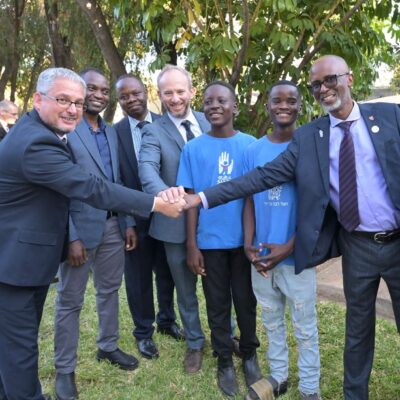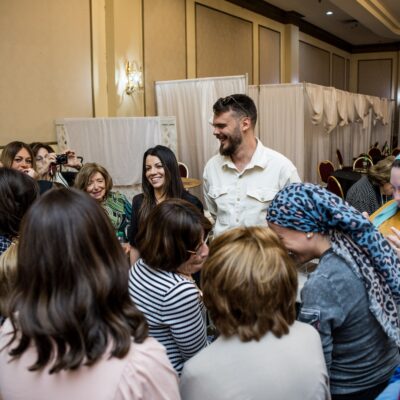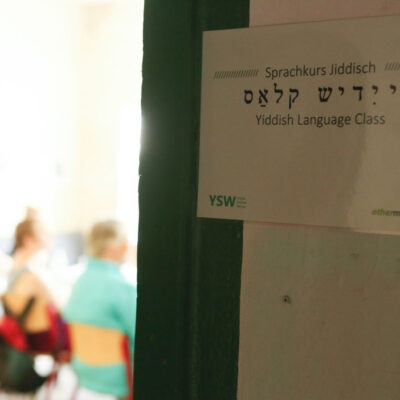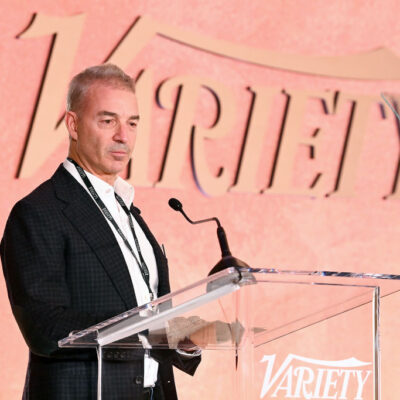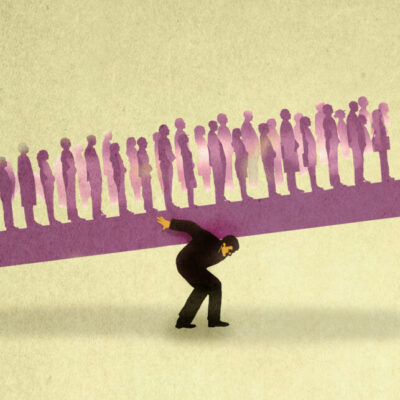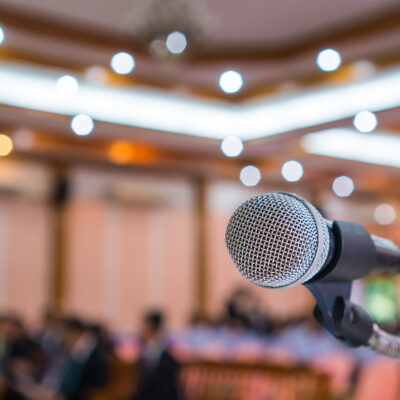DUAL CITIZENS
Thousands gather in DC for a conflict- and politics-focused Israeli American Council summit
Attendees hear from politicians, celebrities, philanthropists and analysts on a host of topics, from antisemitism on campus to the role of philanthropy in Israel after Oct. 7

Haley Cohen/eJewishPhilanthropy
Noa Tishby addresses the Israel American Council summit in Washington, D.C., on Sept. 21, 2024.
Students from elite colleges who have faced antisemitism in the past year; synagogue delegations from Los Angeles to Manhattan; a group of Israelis displaced from their homes who have been living in hotels for more than 11 months.
These were some of the nearly 4,000 Israelis, Americans and Israeli-Americans who convened at the Washington Hilton for the three-day Israeli American Council National Summit, which concluded on Saturday night, to discuss questions such as “Is Israel still start-up nation?” and “How is foreign money shaping the minds of Americans?” Sideline conversations focused on the barrage of more than 100 missiles, rockets and drones Hezbollah directed toward northern Israel this weekend.
The summit’s presence in the nation’s capital was also an “important show of influence for the Jewish community” as the presidential election nears, Elan Carr, the group’s CEO and the former State Department special envoy for monitoring and combating antisemitism under President Donald Trump, told eJewishPhilanthropy ahead of the gathering.
Each day’s plenary had a different theme: commemorating Oct. 7, the fight against antisemitism and the future of the Jewish people. But less than 50 days from the divisive election, an overarching theme throughout the weekend was the impact that the election’s outcome could have on Israel and American Jews.
The election was at the forefront of Thursday evening’s opening plenary where GOP presidential nominee former President Donald Trump delivered a keynote address.
Carr told eJP the group was “not concerned” about appearing to be a partisan organization when Trump spoke “because we made it very clear that we invited the president, vice president and the former president, [and] we have [Biden] administration officials coming.” (President Joe Biden and Vice President Kamala Harris, the Democratic presidential nominee, declined to speak due to scheduling conflicts.)
But in his speech, Trump ratcheted up his partisan rhetoric, warning of dire consequences for Israel if Harris is elected. “If we continue down our current path, with four more years of Kamala, Israel will be faced not just with an attack, but with total annihilation,” Trump said to a standing ovation. “Total annihilation, that’s what you’re talking about. You have a big protector in me.” The former president’s remarks prompted a handful of attendees to exit the room in protest.
Trump called to the stage rescued Israeli hostage Andrei Kozlov to thunderous applause: “He’s got more courage than I have,” Trump said. “We’re going to get them out, they’re going to come out,” Trump said of the 101 hostages that still remain in Hamas captivity.
On Friday, Brett McGurk, Biden’s Middle East coordinator and National Security Council member told the crowd that Hamas leader and Oct. 7 architect Yahya Sinwar will face “justice.” “Justice will come to Yahya Sinwar, make no mistake,” McGurk, a lead member of the White House hostage negotiations team, said.
At this moment, “there is a significant risk of escalation” between Israel and Hezbollah and Hamas to a wider Mideast war, McGurk said, but the U.S. believes a diplomatic agreement can and should prevent that and allow the tens of thousands of displaced Israelis to return home in the north, he added.
“We do not think a war in Lebanon is the way to achieve the objective to return people to their homes,” he said. “There are disagreements with Israel about how you measure escalation risks. It is a concerning situation. But I’m very confident that through diplomacy, through deterrence and other means we will work our way out of it.”
For attendees that preferred an escape from discussion of partisan politics, several panels throughout the weekend offered insight into other topics, including “Philanthropists on the front lines.”
“Philanthropy is all about people,” Shira Ruderman, executive director of the Ruderman Family Foundation, said. “You invest because you believe in someone.”
“Investors need to be louder during these immense challenges,” Ruderman continued.
In a separate panel, the leaders of top Jewish organizations — Carr; Sheila Katz, CEO of National Council of Jewish Women; William Daroff, CEO of the Conference of Presidents of Major American Jewish Organizations; Eric Fingerhut, president and CEO of Jewish Federations of North America; and Ted Deutch, CEO of American Jewish Committee shared insight into how the Jewish community can remain united in a post-Oct. 7 world.
Katz said it is a “skill” to engage in dialogue with those who have different political opinions.
Other speakers at plenaries and panels included Dr. Miriam Adelson, the widow of hotel and casino owner Sheldon Adelson and one of IAC’s chief funders; Florida Gov. Ron DeSantis; British conservative political commentator Douglas Murray; Noa Tishby, former Israeli special envoy for combating antisemitism; Eylon Levy, former Israeli government spokesperson; Jonathan Schanzer, senior vice president of research at the Foundation for Defense of Democracies; and Shabbos Kestenbaum; campus antisemitism activist.
Carr told eJP that a focus of the summit, which was held just weeks ahead of the one-year anniversary of the Oct. 7 terrorist attacks, was a “show of commemoration of the tragedy and suffering we have all felt for the last year.” Many of the panels shed light on the impact Oct. 7, and the subsequent war, has had on Israeli society. These included, “From corporate to combat: The CEOs who dropped everything to join the front line” and “Stories from Gaza,” which included an active-duty Israel Defense Forces soldier of the elite Oketz K9 unit who was recently injured in the war.
Reza Pahlavi, the former crown prince of Iran, addressed attendees during Friday’s plenary as dozens of Iranian Muslim demonstrators for Israel packed the crowd and cheered him on from outside of the hotel. Pahlavi urged a strong “coordinated” U.S.-Western alliance, including Israel, to overthrow the Islamic fundamentalist regime in Iran. “We need to offer maximum support to the people of Iran. And we need to facilitate maximum defections from the regime so that we can peacefully transition from this criminal dictatorship to the secular democracy the Iranian people are fighting for,” he said.
“The people of Iran are your partners, not pawns. Pawns are disposable. My people are not,” Pahlavi said.
After Pahlavi’s speech, the hustle of the summit slowed as attendees changed into mostly white clothing and gathered to bring in Shabbat. At a buffet-style dinner, Rabbi Levi Shemtov, executive vice president of American Friends of Lubavitch, led kiddush with a kiddush cup that was rescued from the ashes of Kibbutz Be’eri.
Reminders of the remaining 101 Israelis held hostage in Gaza were abundant throughout the weekend. On Shabbat, an additional table was set on the hotel patio for the hostages, with a yellow ribbon at each place setting. “Bring them home now” posters lined the walls outside of the venue’s ballroom.
In the basement of the Washington Hilton, a shuk was set up. Instead of offering fruit and candy, the market was a display of Israeli innovation and nonprofits —- with exhibits ranging from established organizations, such as Jewish National Fund and Magen David Adom, to startups established in the aftermath of Oct. 7. Manning the Operation Israel booth was Isabella Sherbatova, the group’s medical director. Operation Israel has shipped $9 million worth of equipment to Israel’s front lines in the past year, she told eJP.
“It’s just beautiful to be here,” Sherbatova said. “To see all of the Jewish people united, and even some people that are not Jewish but are supportive of Israel.”
Sherbatova said she met Christians and Native Americans, “all banding together for Israel.”
Nearly one year into the Israel-Hamas war, Sherbatova said that volunteers and donors are feeling fatigued.
“But this event gives us a push to move forward,” she said. “We can’t give up.”
Ed. note: The reporter’s accommodations were provided by IAC.


